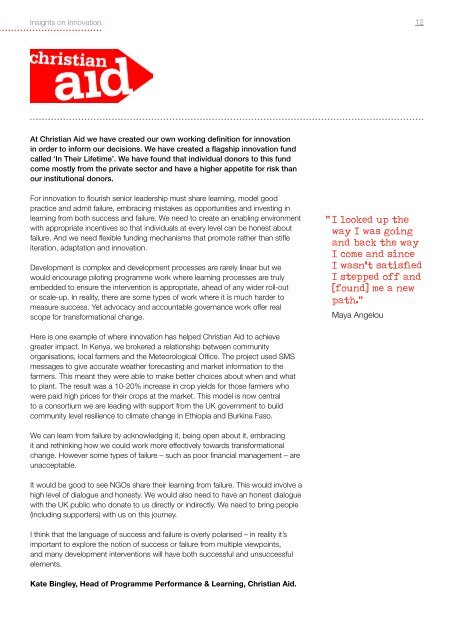O0YQ5
O0YQ5
O0YQ5
Create successful ePaper yourself
Turn your PDF publications into a flip-book with our unique Google optimized e-Paper software.
Insights on Innovation<br />
12<br />
At Christian Aid we have created our own working definition for innovation<br />
in order to inform our decisions. We have created a flagship innovation fund<br />
called ‘In Their Lifetime’. We have found that individual donors to this fund<br />
come mostly from the private sector and have a higher appetite for risk than<br />
our institutional donors.<br />
For innovation to flourish senior leadership must share learning, model good<br />
practice and admit failure, embracing mistakes as opportunities and investing in<br />
learning from both success and failure. We need to create an enabling environment<br />
with appropriate incentives so that individuals at every level can be honest about<br />
failure. And we need flexible funding mechanisms that promote rather than stifle<br />
iteration, adaptation and innovation.<br />
Development is complex and development processes are rarely linear but we<br />
would encourage piloting programme work where learning processes are truly<br />
embedded to ensure the intervention is appropriate, ahead of any wider roll-out<br />
or scale-up. In reality, there are some types of work where it is much harder to<br />
measure success. Yet advocacy and accountable governance work offer real<br />
scope for transformational change.<br />
" I looked up the<br />
way I was going<br />
and back the way<br />
I come and since<br />
<br />
I stepped off and<br />
[found] me a new<br />
path."<br />
Maya Angelou<br />
Here is one example of where innovation has helped Christian Aid to achieve<br />
greater impact. In Kenya, we brokered a relationship between community<br />
organisations, local farmers and the Meteorological Office. The project used SMS<br />
messages to give accurate weather forecasting and market information to the<br />
farmers. This meant they were able to make better choices about when and what<br />
to plant. The result was a 10-20% increase in crop yields for those farmers who<br />
were paid high prices for their crops at the market. This model is now central<br />
to a consortium we are leading with support from the UK government to build<br />
community level resilience to climate change in Ethiopia and Burkina Faso.<br />
We can learn from failure by acknowledging it, being open about it, embracing<br />
it and rethinking how we could work more effectively towards transformational<br />
change. However some types of failure – such as poor financial management – are<br />
unacceptable.<br />
It would be good to see NGOs share their learning from failure. This would involve a<br />
high level of dialogue and honesty. We would also need to have an honest dialogue<br />
with the UK public who donate to us directly or indirectly. We need to bring people<br />
(including supporters) with us on this journey.<br />
I think that the language of success and failure is overly polarised – in reality it’s<br />
important to explore the notion of success or failure from multiple viewpoints,<br />
and many development interventions will have both successful and unsuccessful<br />
elements.<br />
Kate Bingley, Head of Programme Performance & Learning, Christian Aid.


